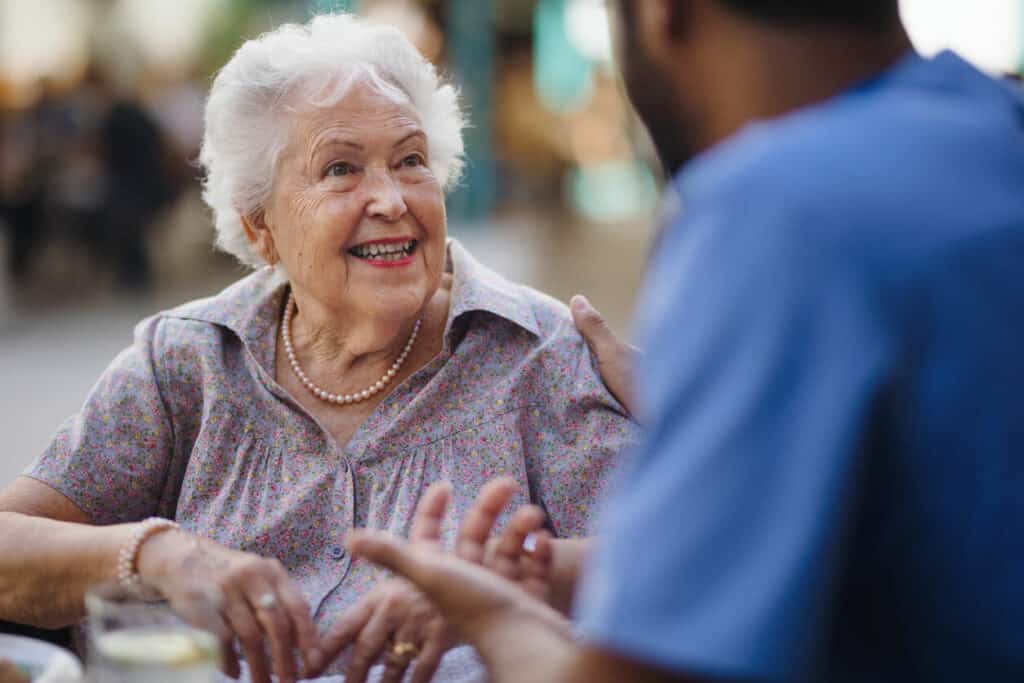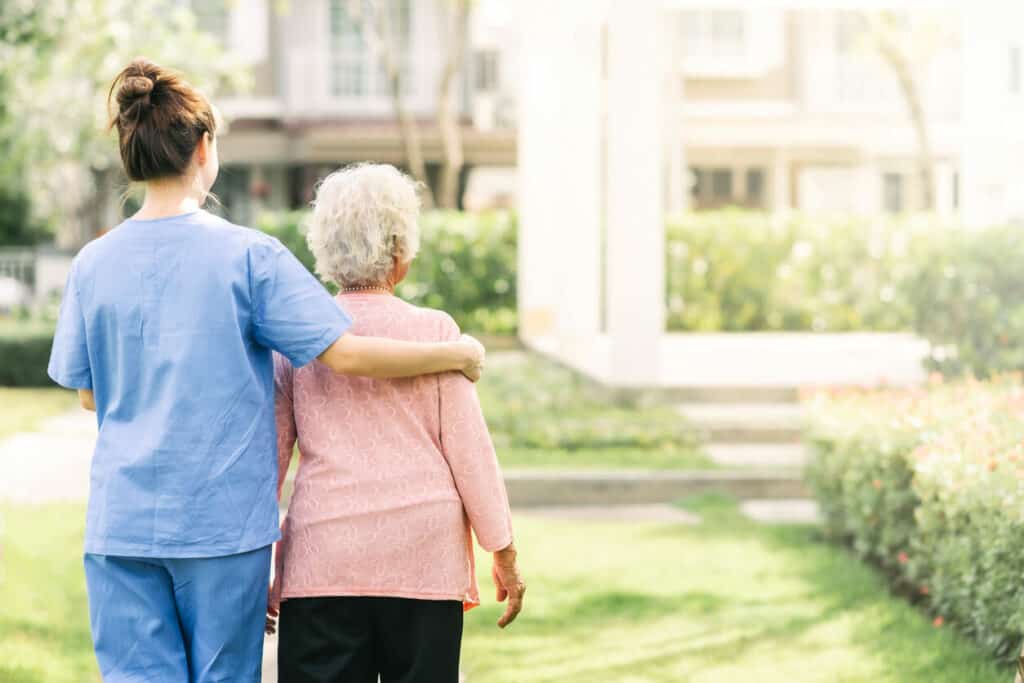
Seniors and their family caregivers can thrive because of the support provided by a professional caregiver. Since most adult children are also holding down at least two responsibilities, a trained caregiver is a backup support who enables family caregivers to balance work-personal life without experiencing burnout and getting ill. Simply put, a certified caregiver provides equilibrium so everyone involved in the care — the senior, adult child, and their own families — can live a less stressful life.
It’s only possible because being a caregiver and pursuing it as a career requires extensive and ongoing education. The knowledge they gain from months of training allows them to offer value-driven care and employ a holistic approach to caregiving.
The Benefits of Senior Caregivers
Senior caregivers are irreplaceable members of the care team. Since they directly deliver care, they have more influence on the recovery or treatment of older people. You can also work with different types of elder caregivers.
Different types of senior caregivers

Professional caregivers
They receive training and certifications for the job. These people have proper caregiving knowledge and may also choose to specialize in specific areas of care, such as dementia or Alzheimer’s disease care or diabetes care. Private duty, home health, hospice, nursing homes, adult day care, and virtual caregivers fall into this category.
You can hire these caregivers from home care agencies, assisted living communities, and other senior-focused businesses.
Family caregivers
If you’re blood-related to the person you provide care for, you belong to family caregivers. These people are either adult children, spouses, grandchildren, or family relatives of the senior.
They may fall short in caregiving training because most are self-educated and not certified. Caregiving for them is a way to show their love for their senior parents or other family members. At some point in the future, some may decide to become full-time family caregivers and receive professional training.
Volunteers
People who want to make an impact in the community often volunteer to help the elderly in their neighborhood. They assist in doing house chores and providing technology classes or socialization to older adults in their homes or local adult centers.
Most volunteers are not certified caregivers. Some are university students and they help in ways they know, like aiding seniors in their daily responsibilities.
Various ways senior caregivers improve the quality of life

Certified caregivers deliver care in a holistic way. It means they provide all-encompassing care to support the physical, social, emotional, and mental needs of the care recipient.
- Physical assistance: They aid in accomplishing activities of daily living, preparing nutritious meals, and ensuring your loved one leads a physically active lifestyle.
- Mental health care: Retirement brings feelings of isolation, loneliness, and loss of purpose, which are detrimental to mental health. Senior caregivers provide companionship care to reduce isolation and challenge your loved one with brain-boosting activities, such as mind games.
- Socialization: Since most seniors retire in a diminishing state of health, they may not be able to travel, go out, or engage in social activities as much as when they are in good health. Staying at home has social health benefits if you hire a senior caregiver to care for your loved one.
- Emotional support: With fewer things to do during retirement and no career that secures their identity, some seniors may find life less meaningful. They may spiral into feelings of hopelessness and lack of purpose. Senior caregivers can offer encouragement, empowerment, and comfort during these challenging times.
A glimpse of caregivers in action
One study on older adults aged 65 and above needing caregiver support to do basic daily tasks showed that those who were cared for by caregivers who had completed a training program had a better quality of life, cognitive ability, and preserved functional ability.
Another study pointed out that peer companionship provided by aging services agencies had helped ease symptoms of depression, anxiety, and suicidal ideation. Socially disconnected seniors who received such intervention also felt feelings of belongingness and improved mental health state.
The Challenges of Senior Caregiving

Many senior caregivers stick to the job because it’s meaningful and satisfying, something that many careers are unable to provide. However, life as a caregiver is challenging and sometimes it compromises their own welfare.
Common obstacles that caregivers face
Emotional exhaustion
It can be an emotionally draining job because caregivers are connected at a deep level to the people they are caring for. It’s often more than just a livelihood for them, so it’s inevitable to develop feelings of compassion and affection for the seniors, including their families.
Burnout
Burnout is prevalent and a significant health concern for many caregivers. Even if they’ve trained for caregiving stress management, the evolving tangle of obligations they carry to do their job well can be overwhelming.
Physical strain
It’s normal to work longer periods, especially if the care demands of the recipient is high. And unless they sit down for small talks with your loved one, they’re mostly on their feet and on the move. They do minor housekeeping tasks, accompany your loved one to doctor’s appointments, and assist someone with limited mobility to the bathroom.
Caregiving stress
All jobs can induce stress but often not as excessive as caregiving. Working as an effective caregiver means all your effort into the job and the person being cared for. Unlike office jobs where employees can work but stay emotionally detached from the company, caregiving requires one to attach their social, emotional, physical, and mental well-being. Therefore, it can be more stressful than any other job. Everyday caregiving stress, when not regulated, can impact the caregiver’s health.
Strategies for overcoming caregiving challenges
Part of the training for caregivers is to learn how to overcome challenges by using various coping strategies.
- Self-care: Caregivers must find the time to check in on themselves and assess their own care needs. Do they need more hours of sleep? Do they need mental health therapy? Do they need to hang out with friends or spend more time doing things they love? Self-evaluation and answering these questions can help determine whether caregivers are in their best health to take care of others.
- Respite care: This brings us to the second strategy, which is respite. Does the primary caregiver need some days off? Do they feel exhausted all the time? Are they not as enthusiastic about taking care of your loved one? Paying attention to early signs of burnout will prevent caregiver burnout.
- Support groups: One of the effects of being a caregiver is isolation. Both in-person and online groups found on social media platforms such as Facebook, can uplift the lives and experiences of caregivers. When they feel they have the support of others through these groups, they feel empowered. Caregiving is sometimes hard and doing it alone can be lonely. Having a group makes a huge difference in staying optimistic in the face of difficult times. It can also be a great source of insightful and free caregiving resources and programs.
- Therapy: Twenty percent of caregivers experience depressive symptoms. Without the support and encouragement of loved ones, caregivers are more likely to feel depressed and experience other mental health problems. Working with a mental health therapist and attending counseling sessions can help caregivers decompress and receive validation for the negative emotions that they feel.
Collaborative care is essential
Senior caregivers should partner with adult children and other family members to ensure they live up to the demands of care of a loved one. At the same time, collaborating helps sustain the balance between work and personal life. The training and accumulated knowledge of senior caregivers can especially aid in this area.
Senior caregivers can share the best care and coping strategies with adult children through caregiver education. By bouncing ideas off each other and keeping communication, both sides can join to provide the highest quality of care to seniors.
A Holistic Approach to Senior Care

The issues associated with the aging process are rarely caused by a single factor. That’s why it’s crucial to take a holistic approach when it comes to delivering care.
The importance of holistic interventions
Maintain optimal health for long term
Providing care for every facet of health guarantees seniors are at their most optimum physical, mental, emotional, and spiritual health. Since most physical illnesses are associated with mental instability, addressing the whole spectrum of care needs can help seniors live healthy and vibrant life in the long term.
Connect the body to the mind to initiate self-healing
The body has amazing self-healing ability. However, the only way to tap into this ability is when the body is positively aligned with the mind. Mental health problems like depression where negative thoughts are dominant can hinder the body from doing its job to self-heal. Seniors should be in the best headspace to aid the body in recovery.
Approach Holistic Wellness by Tailoring Care Plans
Senior caregivers rope in the family and healthcare providers to make up the entire care team. They are the link that helps increase the success of the treatment plan. They work with the family and the rest of the care team by:
- Performing their best: When elderly caregivers provide the best care, it can promote aging in place and better health outcomes.
- Documenting the senior’s health decline or progress: Being a caretaker to a person in need involves keeping records of symptoms, side effects of meditations, and other observable medical or physical health factors to help confirm if the treatment plan is effective or not. Caregivers can also make suggestions on the treatment plan.
- Reduce hospitalizations: The healthcare system generally struggles to stand on an even keel, so if senior caregivers can help reduce hospitalizations, it will benefit the rest of the healthcare team.
- Minimize healthcare costs: In most cases, families contribute to pay for care expenses. Caregivers can ensure that patients adhere to the treatment program and their doctors’ recommendations to reduce out-of-pocket costs.
The care team can maximize the impact of holistic care if involved people work as a team. It requires the family, caregivers, doctors, therapists, and the rest of the care team to collaborate, share ideas, and communicate consistently to achieve better treatment outcomes.
Choosing the Right Senior Caregiver

You should hire a caregiver with experience, proper training, and love to serve others. How do you know if the caregiver in front of you is the right one? Consider the following factors:
Tips for evaluating senior caregiver options
Training
The caregiver must have completed basic caregiver training or an advanced or specialized course. They must be certified.
Experience
They must have several months or years of prior experience. A caregiver with real-life exposure can smoothly process and handle challenging situations on the fly.
Location
Choose a caregiver who lives near your parent’s or relative’s home or within the same city, especially if you live in another state than your senior loved ones. When the caregiver lives close, you can contact them easily during emergencies. As for your senior parents, make sure they save or carry their caregiver contact details and other information if they go out.
Cost
Find caregiving services that your family can afford and sustain. Also, consider the level of care of your loved ones. Do they only need up to three hours of care service? Or do they need more?
Questions to ask when interviewing potential caregivers
To guide you, here are some questions to ask face-to-face when evaluating a caregiver’s abilities.
- What prompted you to pursue caregiving as a profession?
- How do you manage the mental and physical stress of caregivers?
- Do you have a care specialty? How can you help my loved one?
- Are you an introvert or an extrovert? (Asking this question helps determine if the caregiver is social, loves casual talks, and will enjoy listening to your loved one’s stories.)
- How often do you revise a care plan? (It’s critical that the care plan is updated more frequently to reflect changes in a senior’s care needs or current health situation.)
- What kind of hobbies do you love? (They might share one or two hobbies with your senior parent.)
- What type of food can you prepare?
These are some of the basic questions. To better know your caregiver, add situation questions to this list. Ask them what they would do if they’re under stressful circumstances, such as if a loved one with dementia becomes aggressive.
Takeaway

Hiring the right senior caregiver is critical in the progress of your loved one’s health. In a nutshell, you should hire a caregiver who is certified, experienced, and within close proximity to your loved one’s residence.
A holistic care approach is key to optimal health. By combining interventions to address the physical, emotional, mental, social, and spiritual needs of a senior, you ensure that the care needs deficiencies of each health facet are met. A senior caregiver’s support also extends to the family of the care recipient. Building a strong relationship with the family members has merit to a senior’s health.
Amy’s Eden caregivers promote holistic wellness because we believe that true health encompasses several dimensions of well-being, not just physical health. If you’re looking for a caregiver you can trust and depend on to fully support your loved one’s needs, get in touch with us. We’re here to help you every step of the way.




